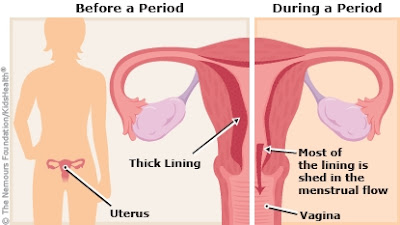When Do Most Girls Get Their Period?
Most girls get their first period when they're around 12. But getting it any time between age 10 and 15 is OK. Every girl's body has its own schedule.
There isn't one right age for a girl to get her period. But there are some clues that it will start soon:
*Most of the time, a girl gets her period about 2 years after her breasts start to develop.
*Another sign is vaginal discharge fluid (sort of like mucus) that a girl might see or feel on her underwear. This discharge usually begins about 6 months to a year before a girl gets her first period.
What Causes a Period?
A period happens because of changes in hormonesin the body. Hormones are chemical messengers. The ovaries release the female hormones estrogenand progesterone. These hormones cause the lining of the uterus (or womb) to build up. The built-up lining is ready for a fertilized egg to attach to and start developing. If there is no fertilized egg, the lining breaks down and bleeds. Then the same process happens all over again.
It usually takes about a month for the lining to build up, then break down. That is why most girls and women get their periods around once a month.
How Does Ovulation Relate to Periods?
Ovulation (pronounced: ov-yoo-LAY-shun) is the release of an egg from the ovaries. The same hormones that cause the uterus lining to build up also cause an egg to leave one of the ovaries. The egg travels through a thin tube called a fallopian tube to the uterus.
If the egg is fertilized by a sperm cell, it attaches to the wall of the uterus, where over time it develops into a baby. If the egg is not fertilized, the uterus lining breaks down and bleeds, causing a period.
Do Periods Happen Regularly When Menstruation Starts?
For the first few years after a girl starts her period, it may not come regularly. This is normal at first. By about 2–3 years after her first period, a girl's periods should be coming around once every 4–5 weeks.
Can a Girl Get Pregnant as Soon as Her Period Starts?
Yes, a girl can get pregnant as soon as her period starts. A girl can even get pregnant right before her very first period. This is because a girl's hormones might already be active. The hormones may have led to ovulationand the building of the uterine wall. If a girl has sex, she can get pregnant, even though she has never had a period.
How Long Do Periods Last?
Periods usually last about 5 days. But a period can be shorter or last longer.
How Often Does a Period Happen?
Periods usually happen about once every 4–5 weeks. But some girls get their periods a little less or more often.
Should I Use a Pad, Tampon, or Menstrual Cup?
You have many choices about how to deal with period blood. You may need to experiment a bit to find which works best for you. Some girls use only one method and others switch between different methods.
*Most girls use pads when they first get their period. Pads are made of cotton and come in lots of different sizes and shapes. They have sticky strips that attach to the underwear.
*Many girls find tampons more convenient than pads, especially when playing sports or swimming. A tampon is a cotton plug that a girl puts into her vagina. Most tampons come with an applicator that guides the tampon into place. The tampon absorbs the blood. Don't leave a tampon in for more than 8 hours because this can increase your risk of a serious infection called toxic shock syndrome.
*Some girls prefer a menstrual cup. Most menstrual cups are made of silicone. To use a menstrual cup, a girl inserts it into her vagina. It holds the blood until she empties it.
How Much Blood Comes Out?
It may look like a lot of blood, but a girl usually only loses a few tablespoons of blood during the whole period. Most girls need to change their pad, tampon, or menstrual cup about 3‒6 times a day.
Will I Have Periods for the Rest of My Life?
When women reach menopause (around age 45‒55), their periods will permanently stop. Women also won't have a period while they are pregnant.
What Is PMS?
PMS (premenstrual syndrome) is when a girl has emotional and physical symptoms that happen before or during her period. These symptoms can include moodiness, sadness, anxiety, bloating, and acne. The symptoms go away after the first few days of a period.
What Can I Do About Cramps?
Many girls have cramps with their period, especially in the first few days. If cramps bother you, you can try:
*a warm heating pad on your belly
*Taking ibuprofen (Advil, Motrin, or store brand) or naproxen (Aleve or store brand)
Looking Ahead
Periods are a natural, healthy part of a girl's life. They shouldn't get in the way of exercising, having fun, and enjoying life. If you have questions about periods, ask your doctor, a parent, health teacher, school nurse, or older sister.


Comments
Post a Comment